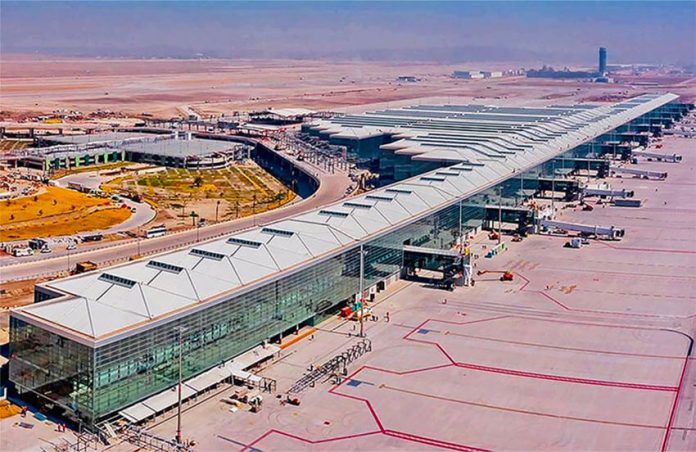Only four airlines will initially use the Felipe Ángeles International Airport (AIFA), which will open north of Mexico City later this month, and the only international flight will be to and from Caracas, Venezuela.
Volaris, VivaAerobús and Aeroméxico will operate four flights each per day between the army-built AIFA and other Mexican airports starting March 21, while Venezuelan state-owned airline Conviasa announced it will fly to and from Caracas once a week on Mondays, although at present its website is only accepting bookings for March 21.
The newspaper Milenio calculated that if all of the scheduled 86 flights per week to and from the AIFA are full, a total of just under 712,300 passengers will use the airport in the space of a year. That figure would represent just 30% of the goal of 2.4 million passengers in the first 12 months of operation.
The airport, built on an Air Force base some 50 kilometers north of the capital’s downtown in México state, is aiming to reach 5 million passengers in 2024, a goal it needs to attain to break even, but has so far been unable to lure any major foreign airlines.
Among the barriers to attracting them is that neither a rail link to the AIFA from central Mexico City nor new road infrastructure have been completed.
In addition, questions remain about the viability of the AIFA, the Mexico City International Airport (AICM) and the Toluca International Airport operating simultaneously due to their proximity to each other.
A new airspace plan has been drawn up, but experts cited by Milenio questioned whether it will be viable once flights to and from the AIFA increase. The then-head of the International Air Transport Association, Alexendre de Juniac, said in 2019 that the simultaneous operation of the airports will be “complex” and “challenging.”
Fernando Gómez Suárez, an air transport expert, noted that the AIFA was built to relieve congestion at the AICM – which the federal government declared last week had reached saturation point –but the relief, at least in the short term, will be minimal with just four airlines offering limited services at the new airport.
If the AIFA were to relieve 30% of the pressure on the AICM it would have to be used by 15 million passengers annually based on 2019 passenger numbers at the latter airport – 50.3 million – or almost 11 million based on numbers for 2021, during which just under 36 million people used the AICM.
The AIFA is slated to have a maximum capacity of 19.5 million passengers in it its initial 2022-32 phase of operations, meaning that a 30%, or even higher, easing of pressure on the AICM appears possible, but that doesn’t look likely until many more airlines shift operations to the new facility.
“There will be those who say that [new] airports start like this, slowly, but … the AIFA should be starting with a large volume of passengers because that’s what the infrastructure was built for,” Gómez said.
“The primary motive was not to have a new airport but to … [reduce pressure on] the AICM, which is showing signs … of saturation,” he said.
Last week’s saturation declaration might counteract airlines’ reluctance to use the AIFA because it could lead to a new, reduced cap being imposed on flight numbers at the AICM. But it is not known when such a limit might take effect.
The planned modernization and expansion of the Toluca airport, located about 60 kilometers southwest of central Mexico City, is also designed to ease pressure on the Mexico City airport, but it is unclear when that project might be completed.
With reports from Milenio, Animal Político and El Universal
